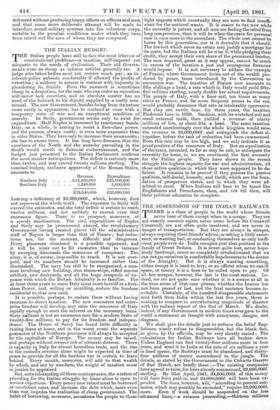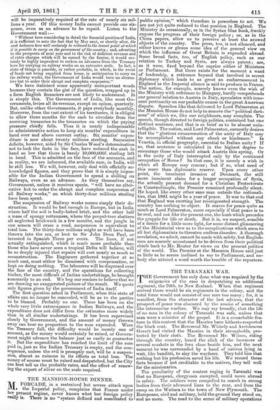THE SUSPENSION OF THE INDIAN RAILWAYS. T HERE is a class
of people in the world whose friends never hear of them except when in a scrape. They are not exactly mauvais 84ete, never come before Sir Cresswell Cresswell, are not often quite insolvent, and are never in danger of transportation. But they are always in scrapes, always requiring their friends' advice, or asking a little assist- ance, or wanting bail, or conducting themselves as only ineffi- cient people ever do. India occupies just that position in the family of Great Britain. It is never quite lost, never hope- lessly bankrupt, never so completely revolutionized that we can resign ourselves in comfortable hopelessness to the decree of the Almighty. But it is always wanting something, either troops it is hard to levy, or an official whom we can ill spare, or money it is a bore to be called, upon to pay. Of all her scrapes, however, the last is the most serious. In- deed, we are not quite sure whether it is a scrape at all in the true sense of that easy phrase, whether the bourne has not been passed at last, and the fatal sentence become in- evitable. Certainly, of the hundred disagreeable statements sent forth from India within the last five years, there is nothing to compare in overwhelming magnitude of disaster with the railway report of the 2nd of March. We doubt, indeed, if any Government in modern times ever gave to the world a statement so fraught with annoyance, danger, and disgrace.
We shall give the details just to enforce the belief Eng- lishmen wisely refuse to disagreeables, but the blank fact, as given by the officials, may be very shortly stated : The calculations for Indian Railways have all broken down. Unless England can find twenty-four millions more in four years, and send it to India at the rate of six millions a year in hard specie, the Railways must be abandoned, and thirty- four millions of money surrendered to the jungle. The details, as stated by the Government in the Calcutta Gazette of 2nd March, are briefly these :—The existing companies have agreed to raise, for lines already commenced, 39,666,0001. sterling. By 31st April, 1861, 34,500,0001. of this money will have been paid in, and 34,000,0001. will have been ex- pended. The lines, however, will, " according to present esti- mates, which may possibly be exceeded," require 22,000,0001. more. Even if work should be suspended on the less advanced lines,—a ruinous proceeding,—thirteen millions will be imperatively required at the rate of nearly six mil- lions a year. Of this money India cannot provide one six- pence, even as an advance to be repaid. Listen to the Government wail
Without here considering in detail the financial position of India, it is sufficient to note the fact that by May next, or shortly after, the cash balances here will certainly be reduced to the lowest point at which it is possible to carry on the government of the country ; and, adverting to the prospects of next year and to the risk of deficient revenue and of extra charges which will be caused by the famine, it would cer- tainly be highly imprudent to reckon on advances from the Treasury here for carrying on railway works on an extensive scale. In fact, a state of things is possible, or rather probable, in which, in the event of funds not being supplied from home, in anticipation to carry on the railway works, the Government of India would have no alterna- tive but to order their abrupt and complete suspension."
We have italicised some apparently unimportant words because they contain the gist of the question, wrapped up in a form English financiers are not likely to understand. It is simply this. The Government of India, like most Go- vernments, levies all its revenue, except on opium, quarterly. But, unlike other Governments, it pays everybody monthly. Moreover, from the vast extent of its territories, it is obliged to allow three months for the cash to circulate from the receiving treasuries to the treasuries on which the paying pressure chiefly falls. Thus it is nearly indispensable to administrative action to keep six months' expenditure in hand over and above current outlay. Six months' expen- diture is now about twenty millions sterling. Successive deficits, however, aided by Sir Charles Wood's determination not to look the facts in the face, have reduced the cash in hand so low that there is barely 10,000,0001. sterling left in hand. This is admitted on the face of the accounts, and in reality, we are informed, the available sum, in India, will be still less. We will, however, only deal with officially ac- knowledged figures, and they prove that it is simply impos- sible for the Indian Government to spend a shilling on Railways, even as an advance. As they themselves say, Government, unless it receives specie, "will have no alter- native but to order the abrupt and complete suspension of all Railway works," on which thirty-four millions sterling have been spent. The suspension of Railway works means simply their de- struction. It would be bad enough in Europe, but in India where half the soil is badly-baked brick, and the other half a mass of spongy rottenness, where the peepul-tree shatters all neglected brickwork in a few months, and the jungle in one season will erase a road, suspension is equivalent to total loss. The thirty-four millions might as well have been thrown into the sea, or lent to Sir John Dean Paul, or invested in Spanish Three per cents. The lines, if not actually extinguished, which is much more probable than those who have never seen a tropical Delta will believe, will be so deeply injured that repairs will cost nearly as much as reconstruction. The Engineers gathered together at so much cost, must either be dismissed with compensation, or kept on doing nothing. The labourers will be dispersed over the face of the country, and the operations for collecting timber, the most difficult of Indian undertakings, be brought summarily to an end. We beg our readers to believe that we are drawing no exaggerated picture of the result. We quote only figures given by the government of India itself. The first question asked in Parliament, when this state of affairs can no longer be concealed, will be as to the parties to be blamed. Probably no one. There has been on the whole very little extravagance in Indian Railways, and the expenditure does not differ from the estimates more widely than in all similar undertakings. It has been supervised closely by Government, and the amount of money thrown away can bear no proportion to the sum expended. Were the Treasury full, the difficulty would be merely one of account, as the money would certainly be raised, or Govern- ment might advance the balance just as easily as guarantee it. But the expenditure has reached the limit of the sum paid in, just as the Indian Treasury is empty, and the con- sequence, unless the evil is promptly met, will be a suspen- sion, almost as ruinous in its effects as total loss. The money of course must be raised and despatched, but the City can best tell us the probable rates, and the effect of renew- ing the export of silver on the. scale required.































 Previous page
Previous page